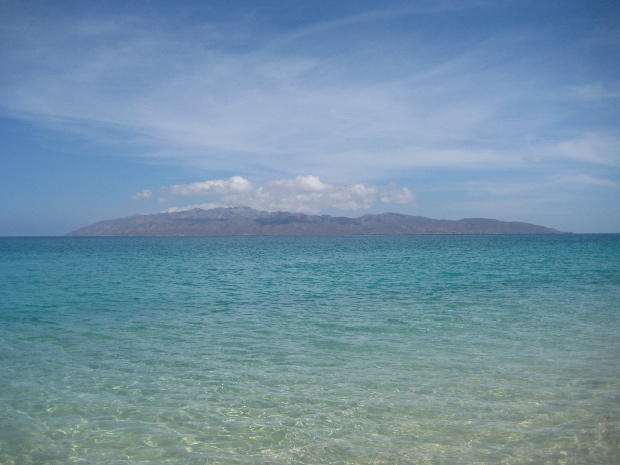
The
Mar de Cortés is one of the world's great fishing grounds and we
decided we couldn't end our time in Baja California without at least
one fishing expedition. Morning is the best time to catch fish in
the waters around La Paz — the earlier the better — so we decided to
arrange the expedition through the hotel, which meant we'd get picked
up there instead of having to drive ourselves to a distant rendezvous at some
ungodly hour.
Captain Jack, the hotel's agent for such things, confirmed the wisdom
of this when he told us we had to be ready to leave at quarter to five
in the morning. We would be driving an hour to the beach we'd set
off from. The 4:45 departure and the long drive sounded grim
but encouraging — we would be in the hands of people who were serious
about catching fish.
We stumbled into a van with four other pescadores
at the appointed hour and headed off towards the west, across the
peninsula that forms one side of the Bahía de La Paz. The last
part of the trip took us over bone-rattling unpaved roads to a remote
beach lined with pangas. The sun had not yet risen but Jorge, the
captain of the panga we'd rented, appeared out of the darkness and
rounded us up, loaded rods and a drink cooler into his boat, dragged
the boat into the ocean, helped us on board and set off towards the
Isla Cerralvo, about a half hour away by sea.
Just off the island he rendezvous-ed with two men in a skiff who sold
us our live bait for the day. The two men wore baseball caps and
slickers and had the exact demeanor of Maine lobstermen — with faces
that seemed carved from granite. (People who work the sea tend to become mythological.)
The sun was well up by now, and our taciturn captain finally asked us
what sort of fish we were looking to catch. “Fish to eat,” I
said. “Only fish to eat.” His face lit up, he smiled
happily and began replacing the big hooks on the poles with smaller
ones. I don't know if he was happy because he thought catching
fish to eat made sense, or because it meant he wouldn't have to deal
with the sort of egos that can't be satisfied with anything less than
impressive sporting trophies, but he was incredibly kind to us from
then on, warm and solicitous.
There were several other chartered boats out in the channel looking for
fish — all open pangas like ours. Our captain looked around to
see who was catching what and finally stopped at a likely spot.
He baited our lines for us and spooled them out by hand to the
indicated depth — he said that the channel here was about 60 feet
deep, its bottom lined with rocks which attracted marine life of all
sorts.
It's always so dramatic and mysterious to set a fishing line out into
the ocean — it seems wildly improbable that it will ever connect with
anything swimming down in that alien realm. I was so happy just
to be out on the surface of that enchanting sea that I wouldn't have minded if we never
caught a thing. But almost instantly Nora's rod began to
jerk. “Fish!” shouted the captain, and slowly but surely Nora
reeled in a big, beautiful dorado, also called a mahi mahi, one of the
tastiest fish to be found in any ocean.
Then I hooked something really big — it was all I could do to land
it. But it turned out to be a bonito, a humongous bonito, which
is not a good a good fish to eat. The captain said he would save
it anyway to give to a friend, for shark bait.
Then Nora landed a smaller bonito, which we threw back, and I landed a good-sized tuna — which of course we kept.
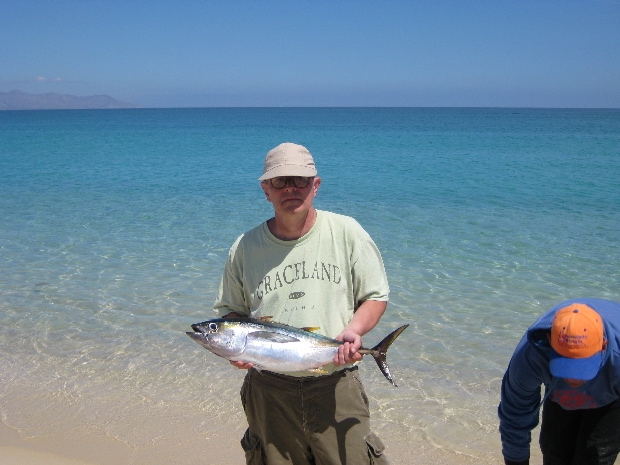
By this time Harry had
become seasick. He was truly miserable but the beach was too far
away to land him on — an hour's round trip. Finally he threw up
over the side, said he felt much better, took up his rod and
immediately caught a nice tuna of his own.
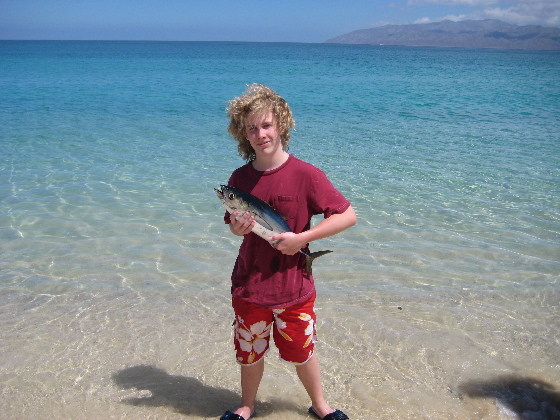
Then his stomach turned
on him again and he was more or less out of commission for the rest of
the trip. (This explains why there are no cool photos here of our time out on the water.)
I caught a parga (a red snapper), a great eating fish, and a trigger fish,
an odd-looking flat fish which I'd never heard of before. “It makes the best ceviche,” our
captain assured us — and he was so right. Lee caught a tuna
then, and we felt we'd had a most successful expedition.
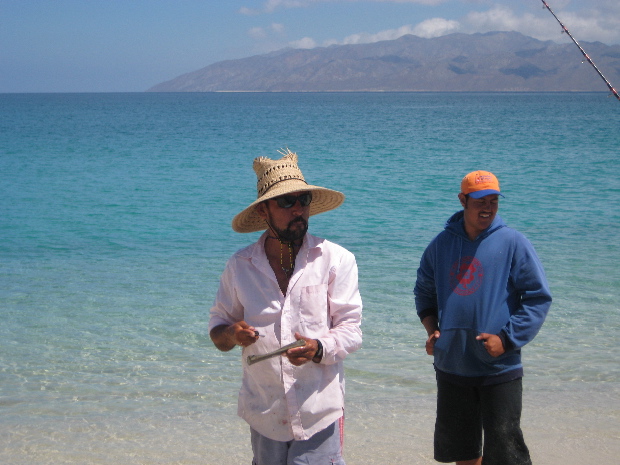
Back on shore the captain (sharpening his knife above) filleted the fish and our driver put it in a
cooler in the van. (I gave the captain my big tuna for his family
— we had more fish than we could eat ourselves in several meals.)
In La Paz that afternoon I took our fish to the restaurant at the hotel and asked
the staff to cook up enough of it for dinner for four that evening and
to
freeze the rest. I asked them to make some ceviche out of the
trigger fish. The waiters had to call the chef to identify the
trigger fish, which they didn't recognize, but he beamed when he saw
it. “Ceviche — yes,” he said.
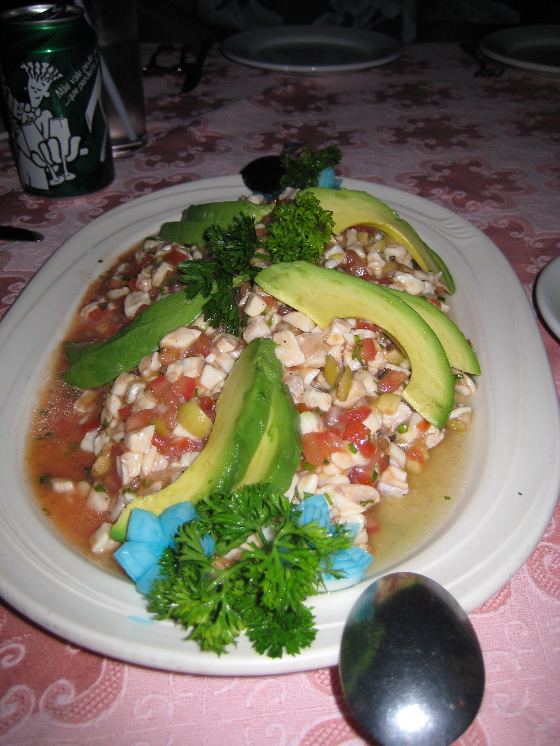
That night we dined like kings — like fishermen. Nora's
dorado
was generally acclaimed as the best-tasting fish of them all, which is
saying a lot when the competition is freshly caught tuna and red
snapper, and the
ceviche made from the trigger fish was sublime. The ocean had
been generous to us, and we took no more from it than we could
use. Life was good.
For previous Baja California trip reports, go here.
[Photos © 2007 Harry Rossi]
